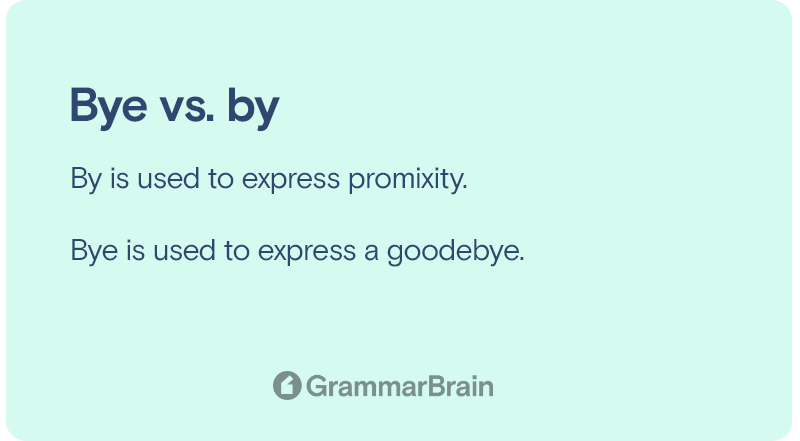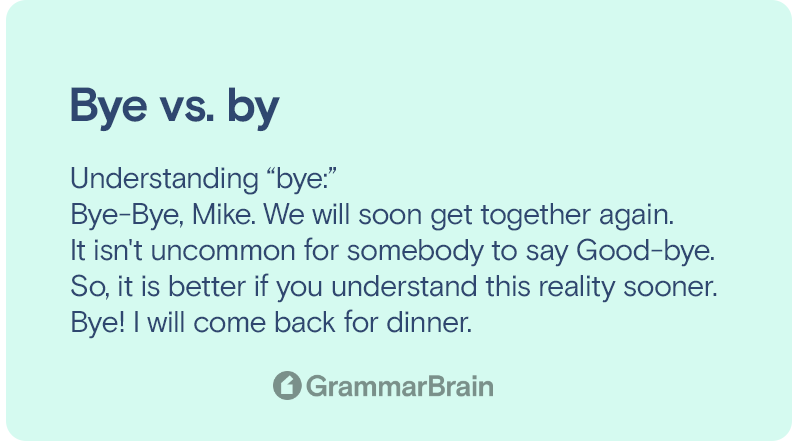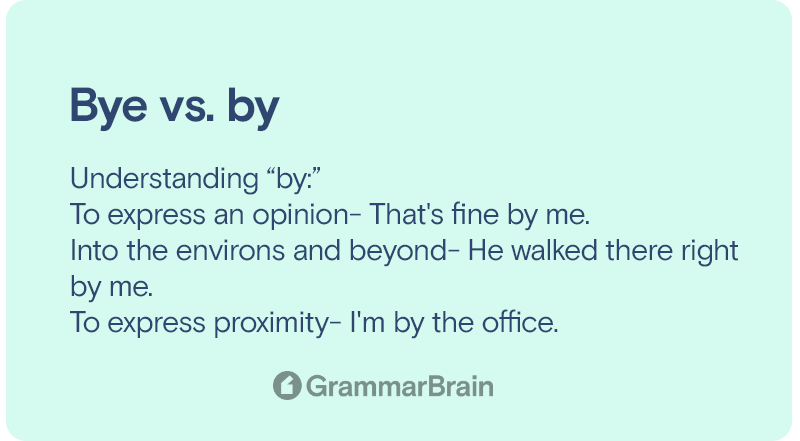Often Bye and By are misspelled or misused as people get confused with these homophones. These two words are homophones since they’re pronounced the same way. However, they differ in both meaning and spelling.
In fact, they aren’t as likely to be that confused as a few other homophones, such as “their,” “there,” and “they’re.” But it is common. We have prepared a complete guide on the English language to make things clear for you.
The difference between bye and by is that ‘bye’ is typically a shortened form of the saying ‘goodbye’. Thus, it’s used to demonstrate farewell or leave someone’s presence. While ‘by’ is generally used as a preposition. It shows who performed a particular action. Moreover, by is also used as an adverb and indicates a past action.
Now let’s dig in deeper to know more about bye vs by…

Bye vs. by: When to Use the Word “Bye”
If someone writes or says bye, they’re typically referring to a shortened version of goodbye. So, bye mainly means the shortened form of goodbye.
Examples In Sentences To Use Bye
- Bye-Bye, Mike. We will soon get together again.
- It isn’t uncommon for somebody to say Good-bye. So, please understand this reality sooner.
- Bye! I will come back for dinner.
However, in sports, the word bye refers to a team or player’s preferential status that is directly moved to the next round without playing with an opponent in the first round.
For Example
- “In lawn tennis, the team was given a first-round bye.”
- Our players will now get a rest as we’ve got a bye

When to Use the Word “By”
The word by has a lot of uses as a preposition. Here are a few examples of by as a preposition
Examples of Sentences to Use By
- To express an opinion- That’s fine by me.
- Into the environs and beyond- He walked there right by me.
- To express proximity- I’m by the office.
- Through the instrumentality or agency of- The photo was captured by him
- To mean the time- You should be here by 7 PM tonight.
NOTE:
The word By can even work as an adverb. When you need to show movement “past” something, you can use the word by, For example, “They drove by”.

Key Differences Between Bye And By
By denotes the performance of any action, while bye means to say goodbye to a person.
‘Bye’ is the abbreviated form of the word ‘goodbye’ while ‘By’ is the result of Old English words such as ‘be,’ ‘bi,’ and other similar expressions.
The key difference between ‘bye’ and ‘by’ is that the term ‘by’ is treated as a preposition and adverb as per the requirement of the situation, while ‘bye’ is generally used as a noun and an interjection.
‘By’ connotes numerous meanings if used in various situations, while the word ‘bye’ doesn’t have much meaning as by
As a preposition, ‘by’ indicates nearness or proximity to someone or something, while the word ‘Bye’ means separating, leaving, or parting from the presence of a thing or person.
In summary
To ensure you use only the correct term or spelling, keep in mind the following:
By can be an adverb or a preposition, but never a noun or verb. Common uses usually include saying how something was done or who did something.
Bye is generally short for the word “goodbye.” However, it’s also a noun. As a noun, it means “a certain time when a player or team doesn’t have to play” in sports.
In other words, for a casual farewell, you can say “bye.” And in other cases, you can use the word ‘by.’
FAQs
What is the difference between by and bye?
Bye is the word you use to say goodbye to someone. For example, Bye-bye! I will return for dinner.
By is generally used as an adverb or a preposition, but never a verb or noun, meaning by is either an adverb or a preposition. For example,
- Preposition- You should be here by 7 PM tonight.
- Adverb-They drove by.
Inside this article
Fact checked:
Content is rigorously reviewed by a team of qualified and experienced fact checkers. Fact checkers review articles for factual accuracy, relevance, and timeliness. Learn more.
Core lessons
Glossary
- Abstract Noun
- Accusative Case
- Anecdote
- Antonym
- Active Sentence
- Adverb
- Adjective
- Allegory
- Alliteration
- Adjective Clause
- Adjective Phrase
- Ampersand
- Anastrophe
- Adverbial Clause
- Appositive Phrase
- Clause
- Compound Adjective
- Complex Sentence
- Compound Words
- Compound Predicate
- Common Noun
- Comparative Adjective
- Comparative and Superlative
- Compound Noun
- Compound Subject
- Compound Sentence
- Copular Verb
- Collective Noun
- Colloquialism
- Conciseness
- Consonance
- Conditional
- Concrete Noun
- Conjunction
- Conjugation
- Conditional Sentence
- Comma Splice
- Correlative Conjunction
- Coordinating Conjunction
- Coordinate Adjective
- Cumulative Adjective
- Dative Case
- Determiner
- Declarative Sentence
- Declarative Statement
- Direct Object Pronoun
- Direct Object
- Diction
- Diphthong
- Dangling Modifier
- Demonstrative Pronoun
- Demonstrative Adjective
- Direct Characterization
- Definite Article
- Doublespeak
- False Dilemma Fallacy
- Future Perfect Progressive
- Future Simple
- Future Perfect Continuous
- Future Perfect
- First Conditional
- Irregular Adjective
- Irregular Verb
- Imperative Sentence
- Indefinite Article
- Intransitive Verb
- Introductory Phrase
- Indefinite Pronoun
- Indirect Characterization
- Interrogative Sentence
- Intensive Pronoun
- Inanimate Object
- Indefinite Tense
- Infinitive Phrase
- Interjection
- Intensifier
- Infinitive
- Indicative Mood
- Participle
- Parallelism
- Prepositional Phrase
- Past Simple Tense
- Past Continuous Tense
- Past Perfect Tense
- Past Progressive Tense
- Present Simple Tense
- Present Perfect Tense
- Personal Pronoun
- Personification
- Persuasive Writing
- Parallel Structure
- Phrasal Verb
- Predicate Adjective
- Predicate Nominative
- Phonetic Language
- Plural Noun
- Punctuation
- Punctuation Marks
- Preposition
- Preposition of Place
- Parts of Speech
- Possessive Adjective
- Possessive Determiner
- Possessive Case
- Possessive Noun
- Proper Adjective
- Proper Noun
- Present Participle
- Prefix
- Predicate



